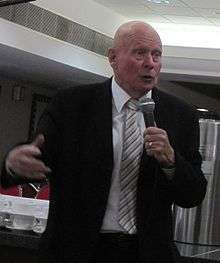Wilf McGuinness
 McGuinness in 2013 | |||
| Personal information | |||
|---|---|---|---|
| Full name | Wilfred McGuinness | ||
| Date of birth | 25 October 1937 | ||
| Place of birth | Manchester, England | ||
| Playing position | Wing half | ||
| Youth career | |||
| 1953–1954 | Manchester United | ||
| Senior career* | |||
| Years | Team | Apps | (Gls) |
| 1954–1959 | Manchester United | 81 | (2) |
| National team | |||
| 19??–19?? | England Schoolboys | ||
| 19??–19?? | England Youth | 4 | (?) |
| 19??–19?? | England U23 | 1 | (?) |
| 1958–1959 | England | 2 | (0) |
| Teams managed | |||
| 1969–1970 | Manchester United | ||
| 1971–1974 | Aris Thessaloniki | ||
| 1974–1975 | Panachaiki | ||
| 1975–1977 | York City | ||
|
* Senior club appearances and goals counted for the domestic league only. | |||
Wilfred "Wilf" McGuinness (born 25 October 1937 in Manchester, England) is a former English football player and manager, who played twice for England. He succeeded Matt Busby as manager of Manchester United. His son, Paul, was Manchester United's U-18 team manager and assistant director of their youth academy for 17- to 21-year-olds.
Playing career
As a player he captained Manchester, Lancashire and England at schoolboy level, and signed for Manchester United in January 1953. He made his first team debut against Wolverhampton Wanderers on 8 October 1955, turning 18 later that month. Competition for places was fierce but he played in enough matches to qualify for a medal when United won the league in 1956.
He was still a United player at the time of the Munich air disaster in 1958, but an injury had prevented him from playing so he was not on the plane that crashed. A broken leg in the 1959–60 season finished his playing career when he was only 22, and came just after he had been capped twice at senior level by the England team.
Managerial career
McGuinness continued to be involved at Manchester United after the end of his playing career, getting heavily involved in coaching, and in 1964, he replaced Jimmy Murphy as reserve team manager, as Murphy left that role after managing the reserve team to a sixth FA Youth Cup triumph. In 1969, McGuinness was promoted from reserve team manager to manager of the first team after Matt Busby retired as manager at the end of the 1968–69 season. Appointed as Busby's successor in June 1969 at the age of 31, at a time when the Manchester United side was in transition and Busby had moved upstairs to become general manager, McGuinness's reign as Manchester United manager was not as successful as United had hoped. But McGuinness did lead United to 3 cup semi finals during his reign, one in the FA Cup and two in the League Cup.
McGuinness was sacked in December 1970, after a dramatic comeback which saw United draw 4–4 with Derby County in a league fixture at the Baseball Ground. He returned to his old job as reserve team manager before leaving the club at the end of the season to become manager of Greek side Aris Thessaloniki. Meanwhile, Busby was re-appointed as manager until the end of the season, following McGuinness' dismissal as first team manager, until Frank O'Farrell was named as Manchester United's new manager in June 1971.
McGuinness later managed Aris Thessaloniki and York City. On arriving at York, he took over a side which had just recorded its highest-ever league finish, only to take them through two successive relegations before leaving midway through a season which ended with York having to apply for re-election to the Football League. Later he worked as assistant manager at Hull City and was on the coaching staff at Bury F.C., taking over as interim manager prior to the appointment of Sam Ellis in 1989.
Honours
Player
Club
- Manchester United
- First Division (2): 1955–56, 1956–57
- Charity Shield (2): 1956, 1957
Managerial stats
| Team | Nat | From | To | Record | |||||||
|---|---|---|---|---|---|---|---|---|---|---|---|
| G | W | D | L | GF | GA | GD | Win % | ||||
| Manchester United[1] | 4 June 1969 | 29 December 1970 | 87 | 32 | 32 | 23 | 127 | 121 | +6 | 36.78 | |
| Aris Thessaloniki | 1971 | 1974 | |||||||||
| Panachaiki | 1974 | 1975 | |||||||||
| York City | February 1975 | October 1977 | |||||||||
References
- ↑ "Manchester United Managers: Wilf McGuinness". StretfordEnd.co.uk. Retrieved 21 December 2011.